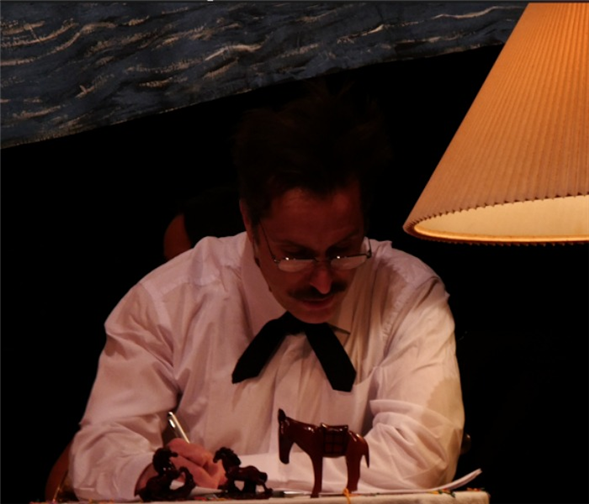Translate Page

How an improv class improved my existence
---
Improv changed my life. Strong words, to be sure, but I'm serious here. I can think of few landmark events as profoundly impactful for me as studying improvisational comedy a decade ago. I didn't go eagerly; I wasn't searching for a hobby or a meet-up group. I was simply a journeyman journalist who'd written a short piece about The PIT, aka The People's Improv Theater, a buzzy comedy school and theatre founded by former Saturday Night Live writer Ali Reza Farahnakian. Once my article came out, I was invited to take a free class. Despite a negative knee-jerk reaction to hanging out with jokesters, I came to the conclusion that I did not, in fact, have anything better to do on Wednesday nights. And so I went.
In a way, what followed was something akin to a religious conversion. I didn't just like it -- I was enlightened by it. Admittedly, I was lucky enough to have as my intro instructor the charismatic Kurt Braunohler, who could be the L. Ron Hubbard of comedy if he wished. His class was awash with affirmation, affection, and acceptance. And we really were a room full of lost weirdos looking to connect with each other as well as the comedy week after week. Even so, as we struggled to find the "funny" moments together, Kurt would always find something kind to say about our greatest failures and flubs. He made us see how absurdity and truth were like conjoined twins, and rather than run away from the freakishness of it all, we should grab it by its many hands.
If someone tells you that you're infantile or French or have a one-legged parrot perched on your head during your scene, go with it. Just say yes. Own it. Take it up a notch if you can. Indeed, the "yes and..." principle is a guiding element in improv. And while I could immediately see how it led to laughs onstage, I soon discovered that approach could positively affect my real life, too. The inevitable morning confrontations on the subway alone had always struck me as prep for a day full of, "NO!" Saying "no" was a part of my survival mechanism…or so I thought. In time, I came to realize how wrong I was.
For there are a variety of ways to say "yes" in everyday life. A yes can simply serve as an acknowledgement that something has been heard. It can also be used as a way to redirect a conversation in a new direction. (That's where the "and" comes in.) Yeses are, more often than not, forward moving. Sometimes they're nudges; sometimes, trampolines. As I consciously worked on eliminating "no" as my default answer in encounters, I found that saying "yes" opened doors for me. Let's face it: "No" tends to slam them.
Furthermore, I liked saying yes. I'm enthusiastic at heart. I like to think of myself as the Angie Dickinson type. (That woman was game!) Improv reconnected me to that sense of adventure, to my eagerness to play. As a result, I was invited to join Gertrude, a newly formed improv team, and then Mingle, one of The PIT's House Teams. Hey, I didn't suck at improv comedy, but I was also fully aware that I was hardly "on my way." I wasn't making a name for myself or about to be discovered. I had no desire to make it in comedy. Plus, do millennials even know who Angie Dickinson is? The most vivid memory I have of performing is the night I mimed nursing a baby with very sharp teeth. Comic genius, I was not.
Yet learning to say "yes" led to many positive changes offstage. After a career in digital journalism, I said yes to a job working in television despite not owning a TV; said yes to adopting a stray dog; said yes to quitting my TV job and working for a start-up at less pay but with more autonomy. I even said yes to having an affair with a Venezuelan philosophy professor. (I said yes a lot that summer.) Most recently, I said yes to playing Friedrich Nietzsche in the conceptual chamber opera History of Madness despite not being a trained singer.
That show's Austrian-American composer Gisburg is a big fan of the late John Cage, a man who rethought the nature of improvisation in contemporary classical music. So her structure for the piece incorporated elements of chance in ways that continually caught me off guard. My entrances and exits were to be intuited; my texts were somewhat randomized; my blocking was a series of suggestions not set in stone. When I arrived at the theatre the night of the performance, the stage was half the size of the rehearsal space, and the set was completely reversed. Instead of letting all that throw me, I decided to embrace it. Why not?
The beauty of improv is if you're up for risk and you surround yourself with people who work cooperatively, then unexpectedly rich experiences can occur. Nothing is more unexciting than the predictable. As Nietzsche himself quipped in The Gay Science, "Someday I wish to be only a Yes-sayer." He may be remembered as the world's greatest existential pessimist but I heartily agree with that sentiment. And so I say "yes" to Nietzsche, too. Yes and...
---
Drew Pisarra's theatre experiences range from ventriloquist (Singularly Grotesque) to librettist (The World Is Round), choreographer (Ladies' Voices) to master of ceremonies (White Wines). Follow him on Twitter at @mistermysterio. Follow TDF at @TDFNYC.
Top image: Drew Pisarra in History of Madness; photo courtesy of the author.
TDF MEMBERS: Browse our discounted tickets to theatre, dance, and concerts.